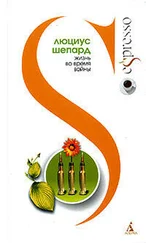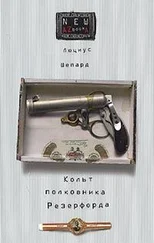About seven o’clock, simply because we felt we should do something else with the day, we walked down to the strip mall, to the Baskin-Robbins, and sat by the window in the frosty air conditioning. I had two scoops of vanilla; she had a butterscotch sundae. We ate while the high school girls back of the counter listened to the same Fiona Apple song again and again, arguing over the content of the lyrics as if they espoused an abstruse dialectic. Jo and I talked, or rather I talked and she questioned me about my childhood. I told her my father had been a saxophone player in New Orleans and that my mother had run off when I was seven, leaving me in his care. Jo remarked that this must have been hard on me, and I said, “He wasn’t much of a dad. I spent a lot of time running the streets. He was primarily concerned with dope and women, but when he was in the mood, he could be fun. He taught me to play sax and guitar, and made up songs for me and got me to learn them. I could have done worse.”
“Do you remember the songs?”
“Bits and pieces.”
“Let’s hear one!”
After considerable persuasion, I tapped out a rhythm on the tabletop and sang in a whispery voice:
“I said, Hey, hey! Devil get away!
Get a move on, boy…
I’ll lay the saint’s ray on ya.
Shake a calabash skull,
Make the sign of the jay…
Don’t you give me no trouble, or as sure as you’re born,
I’ll make you jump now, Satan,
’cause I got your shinbone.”
“They most of them were like that one,” I said. “The old man was a bear for religion. He’d haul me down to the temple once or twice a week and have me anointed with some remedy or another.”
“I can picture you singing that when you were a little boy,” she said. “You must have been cute.”
In the darkened parking lot, I saw the black car I had noticed a few days earlier, the occupants invisible behind smoked glass. The sight banished my nostalgia. I asked Jo what she had told Pellerin the previous day when she talked to him about Ogun Badagris.
“I told him about Donnell,” she said.
“About the big copper veve and all?”
“Yes.” She licked the bottom of her spoon.
“How about your theory? About the Ezawa process being an analog of possession. You tell him about that?”
“I couldn’t lie to him anymore.”
What’d he say?”
“He was depressed. I told him if we got out of this situation, he’d live a long time. Long enough to understand everything that was happening to him. That depressed him even more. He said that didn’t motivate him to want to live that long. I tried to cheer him up, but…” She pinned me with a stern look. “Did you sic those girls on me?”
“What girls?” I asked innocently.
“You know which ones.”
“I was pissed at you. I’m over it now, but I was seriously pissed.”
“Then you would have been delighted by my reaction.” She dabbed at her lips with a napkin. “Once they came in, that was it for the conversation.”
“So y’all had some fun, did you?”
“Maybe,” she said, drawing out the first syllable of the word, giving it a playful reading. “I thought the dark-haired girl was very attractive. You never know, do you, when love will strike?”
“Is that right?”
“Mm-hmm. Think I should have gotten her number?”
“We could invite her on the honeymoon, if you want.”
“Is that what we’re having? A honeymoon?”
“It might have to do for one,” I said.
Not long afterward, we left the Baskin-Robbins and, as we crossed the lot, I noticed a motorcyclist, the same one, judging by his bike, who had tailed me the day before. He was parked about ten slots down from the black car. I thought Billy must be getting paranoid, now that he was close to his goal, and had doubled up on security. We walked along the shoulder through the warm black night. Moths whirled under the arc lamps like scraps of pale ash. Jo’s shampoo overbore the bitter scents of the roadside weeds. She slipped a hand into mine and by that simple gesture charged me with confidence. Despite the broken paths we had traveled to reach this night, this sorry patch of earth, I believed we had arrived at our appointed place.
There was some talk that we should approach Ruddle prior to the game, but I convinced Pellerin and Jo that the wisest course was to wait until we had a better idea of the connection between Ruddle and Billy Pitch. We held a strategy session before the limo picked us up, but since our strategy was basically to throw ourselves on Ruddle’s mercy, the meeting was more or less a pep rally. Pellerin, however, was beyond pepping up. As Jo and I led the cheers, he glumly flipped through channels on the TV and, instead of his usual pre-game ritual of slamming drinks, sipped bottled water.
During the drive, Pellerin sat with a suitcase full of cash between his legs, flipping the handle back and forth, creating a repetitive clicking noise that I found irritating. I rested my eyes on Jo. She had on the black cocktail dress that she’d worn the first time I saw her. Whenever she caught me looking, her smile flickered on, but would quickly dissolve and she would return to gazing out the window. I managed to sustain my confidence by rehearsing what I intended to say to Ruddle. But as we pulled past the gatehouse and the lights of that enormous house floated up against the dark, like a spaceship waiting to take on abductees, I felt a tightness in my throat and, the second we stepped through the door, I realized that Plan A was out the window and, probably, Plan B as well. Standing with a group of middle-aged-to-elderly men at the entrance to the living room, wearing what looked to be powder blue lounging pajamas, was Billy Pitch. Clayton was not in evidence, but close by Billy’s shoulder stood a lanky individual with a prominent Adam’s apple and close-cropped gray hair and a cold, angular hillbilly face. I recognized him from New Orleans—Alan Goess, a contract killer. Clayton, I assumed, was too showy an item for Billy to take on a trip. Seven or eight young men in private security uniforms waited off to one side, watching their elders with neutral expressions, but contempt was evident in their body language.
Ruddle steered Pellerin away and introduced him to the other players, who were dressed in clothes that appeared to have been bought from the same Palm Beach catalogue. Clad in burgundy, olive, nectarine, coral, aqua, and plum, they bore a passing resemblance to migratory birds from different flocks gathered around a feeder. He introduced Billy as an old friend, not a player.
“Not a poker player, anyway,” said Billy, giving Pellerin’s hand a three-fingered shake.
Goess’s eyes licked Jo head to toe. She didn’t seem as anxious as I would have thought, or else she kept her anxiety contained. With Goess in the picture, my best guess was that Billy planned to humiliate Ruddle, then kill him. Whatever his plans, the odds against our surviving the evening had lengthened. I tried to think of an out, but nothing came to me. Ruddle shepherded us across the living room, a considerable acreage with a high ceiling, carpeted in a swirly blue pattern that was interrupted now and again by a sofa grouping or a stainless steel abstract sculpture—it reminded me of the showroom of an upscale car dealer, minus the cars. I wanted to cut Pellerin out of the herd and tell him about Goess, but the opportunity did not arise.
A dealer had been brought in for the occasion, a motherly brunette carrying some extra pounds, dressed in a tuxedo shirt and slacks; a thin, sleek Cubano was behind the bar, dispensing drinks with minimal comment. Some of the men seemed to have a prior relationship with the dealer; they cracked jokes at her expense, addressing her as Kim. Goess and Billy took chairs on opposite sides of the central trophy case, separating themselves from each other, and from Jo and I, who sat in the corner, with Pellerin facing us at the table. Once everyone was settled and a few last pleasantries observed, Kim said, “The game is Texas Hold ‘Em, gentlemen. No Limit. The buy-in is five hundred thousand. Play will run until eight AM, unless an extension is agreed upon. If you go bust, you can make a second buy-in, but not a third.”
Читать дальше






